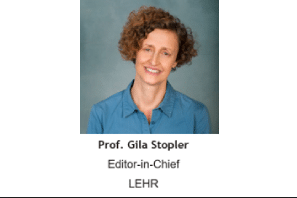The College of Law and Business international law journal has finished third in the world in the human rights category of the 2020 American W&L Law Journal Rankings, narrowly beating out
Harvard Law School which finished fourth.
Only Columbia University Law School and Georgetown University Law School finished ahead of the journal, which is formally known as the Law & Ethics of Human Rights journal.
Law & Ethics of Human Rights Journal (LEHR)
 LEHR aspires to analyze and clarify concepts of moral and legal rights and to contribute to conflict resolution in human rights law.
LEHR aspires to analyze and clarify concepts of moral and legal rights and to contribute to conflict resolution in human rights law.
Each issue of Law & Ethics of Human Rights focuses on one contemporary dilemma that raises major moral and legal questions. Each such dilemma is examined using an interdisciplinary approach to human rights law, an approach that strives to create associations between legal provisions and the philosophy underlying them. Top students are invited to sit on the student editorial board.
LEHR is ranked 3rd in the world in the category of Human Rights and 4th in the world in the category of Jurisprudence and Legal Theory, according to the Washington and Lee Law Review Ranking. LEHR is published by De Gruyter in both print and online and distributed to tens of thousands of subscribers worldwide.
Topics addressed in previous volumes of the journal:
- Human Rights and the Rights of Non-Humans
- Public Religion, Private Communities & Human Rights
- Borders and Human Rights
- Intergenerational Justice
- Labor Rights in the Era of Globalization
Editorial board
Eyal Benvenisti, Tel Aviv University Moshe Cohen-Eliya, College of Law & Business Stephen Macedo, Princeton University Nancy Rosenblum, Harvard University.
“Alei Mishpat”
In addition to LEHR, CLB also publishes “Alei Mishpat”, a law journal in Hebrew. Since it was founded in 1998, “Alei Mishpat” has gained respect and recognition as one of the most influential legal journals in Israel.
Moshe Cohen Eliya, the president of the Ramat Gan-based law school, recounted that around 20 years ago when he returned to Israel after a post-doctorate at Harvard, he was full of enthusiasm to host a conference on racism and multiculturalism, including publishing a book.
 Moshe Cohen Eliya, President of the Academic Center for Law and Business (Credit: Limor Aharon)
Moshe Cohen Eliya, President of the Academic Center for Law and Business (Credit: Limor Aharon)
However, Eliya said he was encouraged by legal scholar Eyal Benvenisti to be far more ambitious by starting an international law journal on human rights.
Also, he credited Prof. Gila Stopler, the college’s dean, who he said took over the reins from him in 2013 in leading the efforts of the journal to its current highs.
The law school also had a third place finish in the world among 600 non-US law journals in terms of the expected impact of the articles.
In that competition, it beat out the European Journal of International Law.
The rankings are a function of a review of how many times a specific journal is cited in all 1,000 journals in the world as well as with a specific focus on citations in the top 400 US journals and top 100 non-US journals.
Two examples of articles in the journal include an article by Harvard University Prof. Mark Tushnet about “Institutions Protecting Democracy: A Preliminary Inquiry,” and College of Law and Business Prof. Iddo Porat about “Solving One-Side Polarization: Supreme Court Polarization and Politicization in Israel and the US.”
The first article notes that agencies concerned with elections and corruption effectively form a fourth branch of government for protecting constitutional liberties.
The second article documents and characterizes the process of politicization and polarization of the Israeli Supreme Court, with the aid of the US analogy.
 LEHR aspires to analyze and clarify concepts of moral and legal rights and to contribute to conflict resolution in human rights law.
LEHR aspires to analyze and clarify concepts of moral and legal rights and to contribute to conflict resolution in human rights law.




